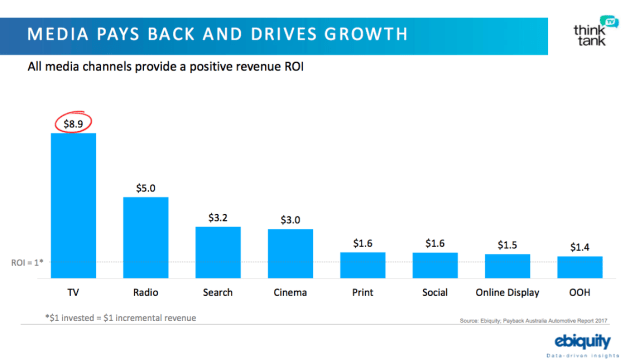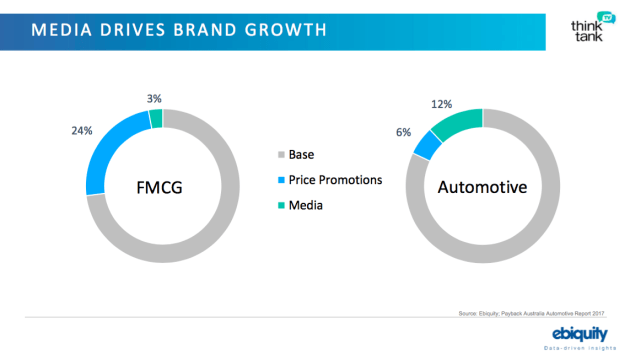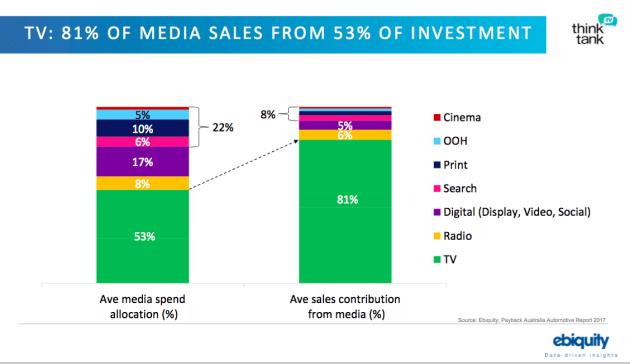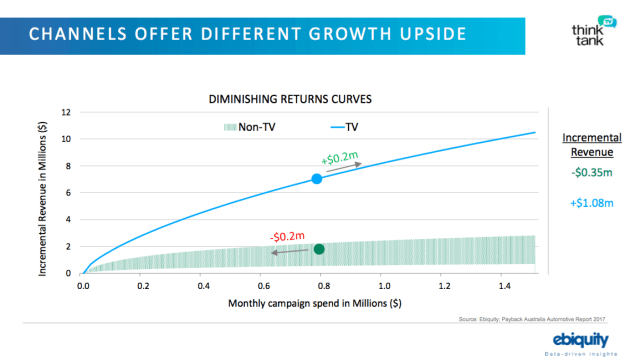
TV advertising easily delivers the largest return on investment for automotive brands in Australia, an Ebiquity study has found.
The second wave of 'Payback Australia', an independent study commissioned by ThinkTV, found that television ads deliver a return on investment of $8.90 per every dollar spent. This was almost double the next most effective channel, radio, which delivered a $5 return.
Search, the leading digital channel, provided a $3.20 return, while online display offered $1.50, behind cinema ($3) and print ($1.60).

The study was based on a 20% sample of the overall automotive market in Australia, with a combined annual media budget of $150 million per year. This included four automotive brands and 30 different models over a three year period.
The research takes into account various factors that affect a sale, such as promotions, seasonal variations, PR, macro-economic factors, new model launches and other variables that may impact sales.
What the study does is attempt to isolate the major factor that delivers sales and assess how media investment causes an uplift.
It shows that media investment has a 12% impact on car sales, worth about $4.26 billion each year to automotive brands in Australia. This is much greater than the FMCG category, where media led to a 3% uplift.

The most telling chart is that TV contributed to 81% of the media uplift, despite only having a 53% average media allocation.
Digital (display, video, social) on the other hand, had 17% of automotive media budget but only contributed to a 5% uplift.

The study raises questions about why marketers over spend on digital when it doesn't produce the most effective results.
In fact, the study found that a $200,000 reallocation from digital to TV led to an incremental revenue lift of $1.08 million, while the same investment in digital only produced a $350,000 lift.

"When the marketing world is placing greater focus on business outcomes, this extensive econometric modelling for the auto category has proven how critical TV is within the media mix. When it comes to the Australian automotive sector, TV is a critical factor in driving sales," Ebiquity Asia Pacific managing director Richard Basil-Jones said.
So why the over-investment in digital?
Industry sources believe that it's easier for marketers to use and justify digital spend on quarterly reporting cycles than the more expensive, yet effective, investments in TV.
There's also a lack of understanding about how effective digital really is and an over-reliance on end of funnel attribution rather than considering the earlier effects of brand awareness that above the line advertising brings.
Ebiquity, which prides itself on being channel agnostic and not "being on anyone's Christmas card list", says the fastest growing part of its business is its marketing performance optimisation business, which provides insights into which channels perform best.
Have something to say on this? Share your views in the comments section below. Or if you have a news story or tip-off, drop us a line at adnews@yaffa.com.au
Sign up to the AdNews newsletter, like us on Facebook or follow us on Twitter for breaking stories and campaigns throughout the day.







